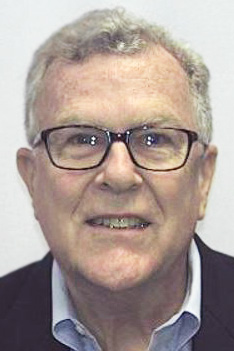

DNS |
Sponsored by |

|
 ICANN's two-year effort to purportedly preserve the Whois public directory to the greatest extent possible while complying with GDPR has failed. Under the latest proposal, the Whois database, once a contractually-required directory of domain name registrants, will be gutted to the point of virtual worthlessness, as registrars, registries, academics, and hand-wringing others ignored the public interest and imposed ever-higher barriers to legitimate, GDPR-compliant access to registration data.
ICANN's two-year effort to purportedly preserve the Whois public directory to the greatest extent possible while complying with GDPR has failed. Under the latest proposal, the Whois database, once a contractually-required directory of domain name registrants, will be gutted to the point of virtual worthlessness, as registrars, registries, academics, and hand-wringing others ignored the public interest and imposed ever-higher barriers to legitimate, GDPR-compliant access to registration data.
 Data privacy and security experts tell us that applying the "need to know" principle enhances privacy and security, because it reduces the amount of information potentially disclosed to a service provider -- or to other parties -- to the minimum the service provider requires to perform a service. This principle is at the heart of qname minimization, a technique described in RFC 7816 that has now achieved significant adoption in the DNS.
Data privacy and security experts tell us that applying the "need to know" principle enhances privacy and security, because it reduces the amount of information potentially disclosed to a service provider -- or to other parties -- to the minimum the service provider requires to perform a service. This principle is at the heart of qname minimization, a technique described in RFC 7816 that has now achieved significant adoption in the DNS.
 As the steward of .ORG, Public Interest Registry is committed to serving as an "exemplary registry" for the DNS. As part of that mission, PIR published our Anti-Abuse Principles last year that serve as our north star to address questions of abuse. As PIR has stated on many occasions, generally speaking, the DNS is not the appropriate place to address questions of website content abuse because of the blunt tool we as a registry have and the collateral damage that can be caused by suspending a domain name for a piece of content.
As the steward of .ORG, Public Interest Registry is committed to serving as an "exemplary registry" for the DNS. As part of that mission, PIR published our Anti-Abuse Principles last year that serve as our north star to address questions of abuse. As PIR has stated on many occasions, generally speaking, the DNS is not the appropriate place to address questions of website content abuse because of the blunt tool we as a registry have and the collateral damage that can be caused by suspending a domain name for a piece of content.
 With DNS abuse a topic of increased concern throughout the community, any controversy over adopting the Uniform Rapid Suspension System (URS) for all generic top-level domains (gTLDs) seems misplaced. The URS was designed as a narrow supplement to the Uniform Domain-Name Dispute Resolution Policy (UDRP), applicable only in certain tightly defined circumstances of clear-cut and incontrovertible trademark infringement involving the registration and use of a domain name.
With DNS abuse a topic of increased concern throughout the community, any controversy over adopting the Uniform Rapid Suspension System (URS) for all generic top-level domains (gTLDs) seems misplaced. The URS was designed as a narrow supplement to the Uniform Domain-Name Dispute Resolution Policy (UDRP), applicable only in certain tightly defined circumstances of clear-cut and incontrovertible trademark infringement involving the registration and use of a domain name.
 The .AU Domain Administration (auDA) will soon implement new .AU domain administration licensing rules either late this year or early next year. These rules apply to new registrations and around 3 million existing domain names in the com.au, net.au, org.au, and more .AU namespaces... Previously, an Australian trademark application or registration may constitute the required Australian presence for an .AU domain name, but the domain name need not match the trademark.
The .AU Domain Administration (auDA) will soon implement new .AU domain administration licensing rules either late this year or early next year. These rules apply to new registrations and around 3 million existing domain names in the com.au, net.au, org.au, and more .AU namespaces... Previously, an Australian trademark application or registration may constitute the required Australian presence for an .AU domain name, but the domain name need not match the trademark.
 In ICANN's "President & CEO Goals for Fiscal Year 2021", Göran Marby went out to make a curious distinction in the document's second stated goal, according to which he intends to "Implement a common strategy for Internet governance (IG) and technical Internet governance (TIG)". Proceeding to state that "we will begin by identifying the most important issues we need to address, followed by an assessment of where and how we can intervene, the venues we should use, and the resources required to be effective".
In ICANN's "President & CEO Goals for Fiscal Year 2021", Göran Marby went out to make a curious distinction in the document's second stated goal, according to which he intends to "Implement a common strategy for Internet governance (IG) and technical Internet governance (TIG)". Proceeding to state that "we will begin by identifying the most important issues we need to address, followed by an assessment of where and how we can intervene, the venues we should use, and the resources required to be effective".
 As outlined in CSC's recent 2020 Domain Security Report: Forbes Global 2000 Companies, cybercriminals are disrupting organizations by attacking the protocol responsible for their online presence -- their domain name system (DNS). When a DNS is overwhelmed with traffic due to a distributed denial of service (DDoS) attack or configuration error, content and applications become inaccessible to users, affecting both revenue and reputation.
As outlined in CSC's recent 2020 Domain Security Report: Forbes Global 2000 Companies, cybercriminals are disrupting organizations by attacking the protocol responsible for their online presence -- their domain name system (DNS). When a DNS is overwhelmed with traffic due to a distributed denial of service (DDoS) attack or configuration error, content and applications become inaccessible to users, affecting both revenue and reputation.
 If you are interested in presenting at the ICANN 69 DNSSEC and Security Workshop during the week of 17-22 October 2020, please send a brief (1-2 sentence) description of your proposed presentation to [email protected] by 27 August 2020. We are open to a wide range of topics related to DNS, DNSSEC, DANE, routing security, and more. There are some ideas in the Call for Participation below, but other ideas are definitely welcome, too!
If you are interested in presenting at the ICANN 69 DNSSEC and Security Workshop during the week of 17-22 October 2020, please send a brief (1-2 sentence) description of your proposed presentation to [email protected] by 27 August 2020. We are open to a wide range of topics related to DNS, DNSSEC, DANE, routing security, and more. There are some ideas in the Call for Participation below, but other ideas are definitely welcome, too!
 With the publication of the Australian Governmental report on Digital Platforms1and in the light of the ongoing work on the EU's Digital Services Act, the spotlight of policymaking is on platforms such as Google, Facebook and Amazon. It is natural that members of the ICANN community want to discuss the role of platforms within the ICANN framework, but sadly and predictably, the usual bylaws jockeys and keepers of the true ICANN faith were quick to stifle the conversation.
With the publication of the Australian Governmental report on Digital Platforms1and in the light of the ongoing work on the EU's Digital Services Act, the spotlight of policymaking is on platforms such as Google, Facebook and Amazon. It is natural that members of the ICANN community want to discuss the role of platforms within the ICANN framework, but sadly and predictably, the usual bylaws jockeys and keepers of the true ICANN faith were quick to stifle the conversation.
 One of the "fathers of the internet," Vint Cerf, in a September 2019 article he published, said: "Today, hackers routinely break into online accounts and divert users to fake or compromised websites. We constantly need to create new security measures to address them. To date, much of the internet security innovation we've seen revolves around verifying and securing the identities of people and organizations online.
One of the "fathers of the internet," Vint Cerf, in a September 2019 article he published, said: "Today, hackers routinely break into online accounts and divert users to fake or compromised websites. We constantly need to create new security measures to address them. To date, much of the internet security innovation we've seen revolves around verifying and securing the identities of people and organizations online.